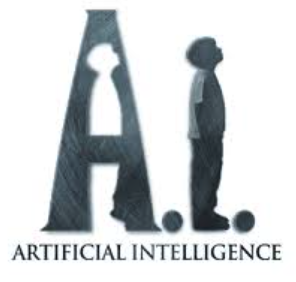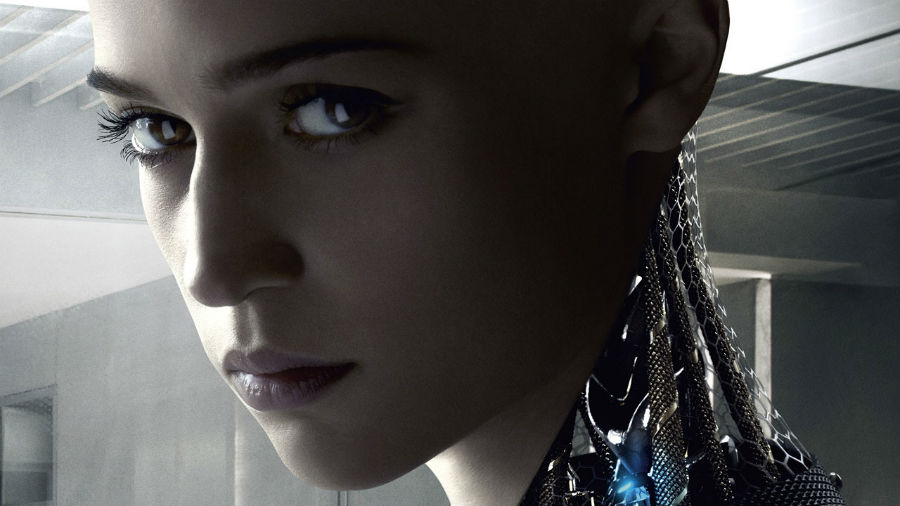 Have we come a long way, baby? I don’t know. I’m not going to pretend to have a line on the first AI done in film or novel or story—and, after Ex Machina, no way am I going to profile myself Feed-style by entering this into a search engine—but, working from my limited set, I can see us starting in the general area of Hal 9000, a male AI, coming up from ‘him’ to the also-male computer in War Games, and, after that, AI goes largely female. Yes, no?
Have we come a long way, baby? I don’t know. I’m not going to pretend to have a line on the first AI done in film or novel or story—and, after Ex Machina, no way am I going to profile myself Feed-style by entering this into a search engine—but, working from my limited set, I can see us starting in the general area of Hal 9000, a male AI, coming up from ‘him’ to the also-male computer in War Games, and, after that, AI goes largely female. Yes, no?
I mean, Jane from the Ender books is the obvious female AI (or, that’s the voice she uses for Ender), but three decades later we’re still at Samantha in Her, and between them there’s everything from Cherry 2000 to whatever AI that is that Clive Cussler’s Juan Cabrillo salvages (in . . . was it The Jungle?). Or, just look at the first three Terminators, how they process from a male terminator to a ‘scary’ female one. That seems to track, in miniature, how our stories have dealt with AI and gender.
But why? What does it say about us that this is the story we seem to prefer? Is it the ‘incorporate’ woman who’s somehow actually . . . non-threatening? compelling? (which seems a poor way of incorporating a woman into the storyline. related: if fantasy-tech is the only way to incorporate women into a story, that might be an alarm right there, then could be something’s wrong right there) Or is that males aren’t to be trusted with all this data and computing power?
What I suspect? It could be veiled form of homophobia. Whereas Hal 9000 and the War Games AI were both located over ‘there,’ in the console, so many of the AIs since then have been of the earbud variety. And that kind of in-head intimacy, in a landscape where males are usually the lead characters, would apparently be uncomfortable for the audience.
Think?
And, I don’t mean to call Her homophobic. Most aren’t, I’m sure. Just, I’m trying to track why it is that so many AI representations end up being female, or presenting as female. And I’m not saying there’s not been corrective efforts as well. Check Scalzi’s The Android’s Dream, say, where the AI ‘Brian’ is often in-head with one of the heroes. But then, too, Altered Carbon‘s hotel AI, it’s default-female again.
I don’t know. Chances are it’s a lot more complicated than I’m suspecting, in these ten minutes before I need to be doing other things.
To be sure, though, in no way am I accusing Ex Machina of this. It’s a very fun and well-produced story—reminds me a lot, for a while, of Brian Aldiss’s 1955 story “Outside” (first line: “They never went out of the house”), but then its Sunshine third act takes over, just, with the Will Smith version of Azimov’s robots, that, yes, take Cherry 2000 as a model (which must have shared some marquee with Fatal Attraction, which it largely is, except for the science). And the ‘alienness’ of this new intelligence kept getting me in the mind of Under the Skin.
All of that’s good, too.
And, I managed not to catch Transcendence, but it seems the easy and obvious go-to that it would have to end as this one basically does, yes? With that cursor blinking. With the next thing about to happen.
For a decade and more we’ve been telling ourself that story with zombies, mostly. Now, with quantum computing getting closer and closer, maybe we’re trending tech-ward.
Only slight, slight disappointment with Ex Machina? For a movie so schooled in Turing and Robot Dreams and all that—but maybe this would have been low-hanging fruit when in Christopher Nolan land?—Ian McDonald’s old “Any AI smart enough to pass a Turing test is smart enough to know to fail it” never quite surfaces.
But then again, I was probably just waiting for it so I could pounce, which would make me feel smart. However, I must not be that smart. I didn’t quite see the end of Ex Machina coming, though it’s built in the whole way. Not sure if that’s the mark of a well-told story. It’s definitely one of them, though.






Only recent male-AI that really comes to mind is Kevin Spacey’s GERTY in “Moon,” which, while initially unsettling just because that’s Rockwell’s only companion, ultimately is Rockwell’s friend and protector.
As far as female domination in AI, part of me wonders if the HALO series had something to do with its popularization, which for almost fifteen (!) years had a barely-speaking male protagonist (you) with a female AI companion perpetually in your head (Cortana).
Many dudes simply grew up with the concept that AI is a female construction, with sultry, NPR-like voice acting. Whether that’s good or bad, shit, I have no idea. But I can’t help but think that there’s something to that.
man, MOON. of course. thanks.
and, I bet you’re right about HALO. had no idea about—about any of that game, I guess. thanks. also, it reminds me that I’m forever going to be shy of any kind of complete synthesis so long as the only videogame I know is Galaga.